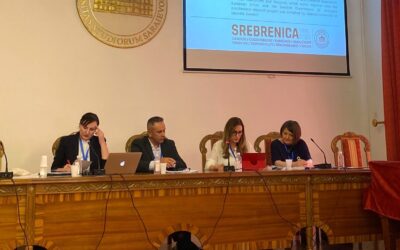
During the 1992-1995 war in Bosnia and Herzegovina thousands of women and girls were raped, often with extreme brutality. The testimonies women gave just after the war resulted in widespread media attention, public outrage and changes in international law. However since then very little has been done for the survivors.
In 2009, Amnesty International went to Bosnia and Herzegovina to speak to survivors of war crimes of sexual violence about their needs, problems and experiences with the justice system. The conclusions were clear: the authorities have failed to ensure access to justice and reparation to the survivors.
Survivors continue to suffer trauma and other psychological and physical problems as a result of rape and other forms of torture they experienced during the war. Many survivors cannot afford medicines even when these are prescribed by a doctor. Many are unemployed and live in poverty. Social and economic support services for the survivors are generally not available.
In addition, those responsible for their suffering, members of military forces, police and paramilitary groups, enjoy impunity. Some remain in positions of power and live in the same community as their victims.
Survivors of sexual violence want the authorities to acknowledge their rights as victims of war crimes. Instead, the women still find themselves marginalized and neglected. Women survivors of war crimes of sexual violence are discriminated against with regard to social benefits and other support available to them in comparison to war veterans, who enjoy access to health care, generous pensions and other social benefits.
Unlike the ex-combatants who formed powerful and vocal associations, women who experienced war rape are less likely to publicly demand their rights. They are afraid of the social stigma attached to rape and they rarely even tell their families what happened to them during the war.
This year the Bosnia and Herzegovina authorities finally took a stand against the marginalization of survivors of war rape. As a result of huge international pressure, including by Amnesty International, a number of policy and legal changes were initiated by the government with the aim of bringing justice and reparation to survivors of war crimes of sexual violence.
In July the Ministry of Human Rights and the Ministry of Justice announced that the government will amend relevant laws and set up a state strategy on improving the situation for survivors of war crimes of sexual violence. It is crucial that the new government formed after elections in October effectively continues the positive work initiated by their predecessors in response to survivors needs.
Take Action
Send an email to the newly elected Chairman of the Council of Ministers of Bosnia and Herzegovina (still waiting for election) urging him/her to continue the work of the previous government and deliver justice to the victims of war crimes of sexual violence.
Authorities must ensure access to reparation for survivors of war rapes in Bosnia and Herzegovina
Dear Excellency,
I am deeply concerned about the situation of survivors of war crimes of sexual violence in Bosnia and Herzegovina. Thousands of women who were raped and sexually abused during the 1992-1995 war in Bosnia and Herzegovina are still waiting for justice and reparation.
In addition, women survivors of war crimes of sexual violence and other civilian victims of war are discriminated against with regard to social benefits and other support available to them in comparison to war veterans, who enjoy access to more generous social benefits, including health care and pensions.
After years of neglecting the needs of the survivors, last year the Bosnia and Herzegovina government finally took a stand against the marginalization of survivors of rape during war by initiating several policy and legal changes in order to bring them justice.
In June 2010 during the Universal Periodic Review session at the Human Rights Council the government of Bosnia and Herzegovina made a commitment to improve the situation of survivors of war crimes of sexual violence, by providing them with access to justice and reparation. The government also committed to amend the existing state legislation, to ensure that all civilian victims of war in the country have equal access to social benefits.
Consequently, in July 2010 the Ministry for Human Rights and Refugees initiated the development of a Strategy for Women Victims of Sexual Violence in Conflict and Beyond in order to respond to the needs of the survivors and provide them with access to reparations.
The Ministry has also initiated the adoption of a new Law on the Rights of Victims of Torture and Civilian Victims of War, which would ensure that all civilian victims of war in the country will have equal access to social benefits and other measures of social support.
The Strategy on Transitional Justice initiated earlier this year by the Ministry for Human Rights and Refugees and the Ministry of Justice is also crucial to ensure effective access to justice for the survivors.
I am therefore urging you to ensure the continuation of all these positive legal and policy changes initiated by the previous government and to prioritize the needs of the survivors.


